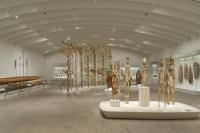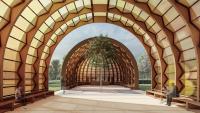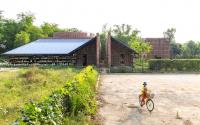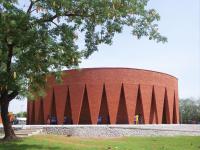MB 110 | Bierbrunnen
Salzburg, Austria
Along the Munich Federal Highway, stretching between the "Salzburg-Mitte" highway exit and the state border with Germany, unfolds the construction site of this project. This historically significant location, known as the "Lieferinger Spitz," marks the crucial intersection of the Munich Federal Highway, Forellenweg, and Lieferinger Hauptstraße. At this juncture, the four-lane road gracefully converges into a three-lane passage leading to the Salzburg Mitte traffic hub.
The site contends with heightened vehicular activity and daily traffic bottlenecks along the primary ingress and egress route to and from the regional capital. Responding to this, the State of Salzburg has expanded and closed the four-lane roadway segment between the border of Freilassing and Salzburg Mitte. Carefully integrated pedestrian and bicycle paths on both sides of the four lanes now connect Salzburg with the neighboring Bavarian enclave of Freilassing.
The recently realized architectural unit, designed in the form of an L, orchestrates a nuanced interplay within the urban commercial zone, along the bustling main thoroughfare, and the small, familial enclave behind. The terraced floors are harmoniously concentric to the inward-facing, noise- and emission-shielded open spaces of the residences. The astute volumetric placement not only protects the living spaces from street emissions but also establishes a buffer zone for the quiet, intimately structured neighborhood in the background, thereby improving the overall situation.
Adjacent to the Munich Federal Highway and the traffic junction, the building projects itself assertively, defining the urban space along the traffic axis in a three-dimensional context. The elaborately designed projections significantly contribute to the overall allure and the creation of a recognizable "landmark" befitting the urban significance of this location. The urban edge of the adjacent property, especially the neighboring building towards Freilassing, is embraced and transitioned into the extended street course through a deliberate curvature in the building. The volumetric projection intensifies towards the intersection, deliberately refraining from further deviation towards the development on the opposite side of Forellenweg.
Additionally, the newly created pedestrian and bicycle path in this area is partially covered, forming a protected, gallery-like space for the ground-floor business premises. This not only enhances the overall attractiveness of the street but also enriches the experiential quality of environmentally friendly mobility. The building is conceived as a versatile urban house, housing various office units, commercial spaces, and 34 apartments. An existing building is overlaid up to the third full floor.
With the refined mobility concept developed during the project and a nearby bus stop, users of the building have diverse options for embracing low-emission modes of transport as a simple alternative to cars. The project enables the expansion of the Munich Federal Highway by an additional lane for motorized vehicles, bicycles, and pedestrians on both sides of the road, overcoming limitations imposed by the positioning of existing buildings on the future traffic area.
- Architects
- Lechner & Lechner Architects
- Location
- Münchner Bundesstraße 110, 5020 Salzburg, Austria
- Year
- 2023
- Client
- VO Immobilien
- Team
- Horst Michael Lechner, Christine Lechner, Lukas Ployer, Paul Lechner
- Baumanagement
- Bleierer Baumanagement GmbH
- Statiker
- Thomas Forsthuber
- Ausführunsplannung
- HB2 Projektmanagement GmbH
- Bauunternehmen
- Kreuzberger Bau Salzburg GmbH





























